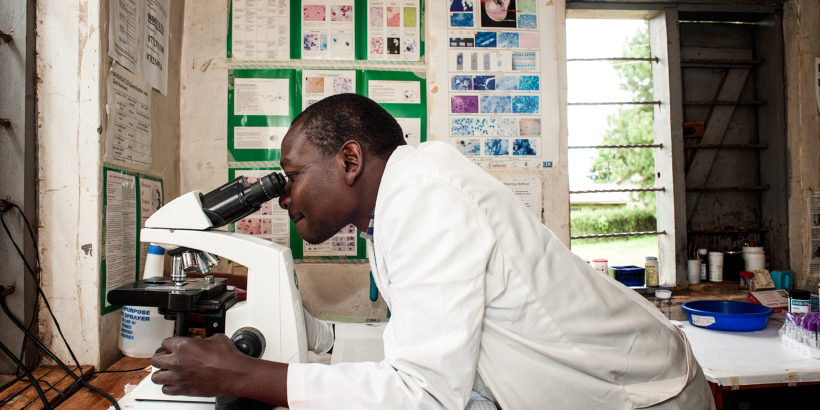Decades of research have proven that typhoid prevention and control solutions are efficacious and yield health impact. Ongoing global research continues to build our strong knowledge base, but there is still more we need to know to continue efforts to #TakeOnTyphoid.
What we know: past typhoid research
Typhoid disproportionately affects children and adolescents in low- and middle-income countries. The Global Burden of Disease Study estimates more than 7 million cases of typhoid and more than 93,000 typhoid-related deaths worldwide in 2021, largely concentrated in South Asia and sub-Saharan Africa. However, the burden is thought to be underestimated given diagnostic challenges and difficulties with surveillance.
Increasing drug resistance is a persistent threat. While typhoid can be treated successfully with appropriate antibiotics, the rate of cases resistant to available treatments is increasing globally. Resistance to newer, more efficacious antibiotics for typhoid is becoming more prevalent, particularly in low- and middle-income countries where accurate diagnosis and treatment are difficult.
Typhoid is preventable. The best way to take on typhoid is through an integrated prevention and treatment approach including typhoid conjugate vaccines (TCVs); improvements in water, sanitation, and hygiene (WASH); improved typhoid diagnostics; and appropriate antibiotics.
TCVs are safe and provide strong protection for at least four years after a single dose in children older than 6 months of age. In 2018, the World Health Organization (WHO) recommended TCV as the preferred typhoid vaccine, with TCV introduction prioritized in countries with the highest burden of typhoid disease or a high burden of drug-resistant typhoid. WHO recommends that prequalified TCVs be introduced into routine childhood immunization programs as a single dose for infants and children older than 6 months of age, accompanied by catch-up vaccination campaigns for children up to 15 years of age where feasible. There are currently three WHO-prequalified TCVs: Typbar TCV® manufactured by Bharat Biotech, India, TYPHIBEV® manufactured by Biological E, India, and and SKYTyphoid™ manufactured by SK bioscience, Korea. Three large Phase 3 efficacy studies conducted in Bangladesh, Malawi, and Nepal showed that TCV prevented 79-85 percent of typhoid cases in children 9 months to 16 years old. Results from a Phase 2/3 study in India found TYPHIBEV to be safe and immunogenic, with an immune response profile similar to that of Typbar TCV. Results from a Phase 3 study in Nepal found SKYTyphoid to be safe and immunogenic, with an immune response profile similar to that of Typbar TCV.
What we’re learning: ongoing typhoid research
Surveillance: Typhoid is more prevalent than originally thought. Surveillance studies aim to create an accurate, comprehensive estimate of the global burden of typhoid. Continued surveillance enables us to gather better data to inform vaccine programs, as well as monitor drug resistance and new or ongoing outbreaks.
Recent surveillance studies include:
-
- The Typhoid Surveillance in Africa Project (TSAP), which has concluded. The project identified a much larger burden in sub-Saharan Africa than previously understood.
- The Strategic Typhoid Alliance across Asia and Africa (STRATAA) study, which used serological surveillance in Bangladesh, Malawi, and Nepal, and uncovered a significantly higher burden than suggested by standard surveillance.
- The Surveillance of Enteric Fever in Asia Project (SEAP), which was a blood culture surveillance study in Bangladesh, Nepal, and Pakistan, found substantial disease burden across diverse communities in these countries, with the highest incidence among children.
- The Severe Typhoid Fever Surveillance in Africa (SETA) Program found a high burden of typhoid among children younger than 15 years old and reported on drug-resistance trends in six African countries.
In addition to morbidity and mortality data, these studies will provide information on risk factors, socioeconomic impact, and the long-term implications of typhoid.
Diagnosis: Typhoid diagnosis is best confirmed through blood cultures, which require laboratory equipment and are difficult in low-resource settings. Without access to laboratory equipment, typhoid tends to be diagnosed based on clinical symptoms, which can be mistaken for malaria, influenza, pneumonia, and other febrile illnesses. New research and development for more reliable point of care diagnostic tests will help improve diagnoses, reduce over-prescription of antibiotics, and increase accuracy of disease burden estimates.
Prevention with vaccines: The Typhoid Vaccine Acceleration Consortium (TyVAC) works with governments in low- and middle-income countries to introduce TCV in high-burden typhoid areas. TyVAC is leading typhoid research to assess existing data and generate new evidence related to typhoid disease burden, drug resistance, vaccine cost-effectiveness, health impact analyses, and TCVs. TyVAC has conducted clinical studies with Typbar TCV in Bangladesh, Burkina Faso, Malawi, and Nepal, and is performing country-level analyses to understand the economics behind vaccine rollouts and inform national decision-makers.
The Typhoid Conjugate Vaccine Introduction in Africa (THECA) project generates evidence critical to decision-making on TCV introduction into routine immunization programs in typhoid-endemic countries in Africa. THECA is conducting two large-scale TCV studies: a cluster-randomized trial in Agogo, Ghana and a mass vaccination campaign in Kisantu, Democratic Republic of Congo. In addition to measuring vaccine effectiveness, these studies will generate information about the feasibility and cost-effectiveness of different vaccine introduction approaches.
Monitoring drug resistance: Monitoring the spread and patterns of drug-resistant typhoid is important to inform effective prevention and control efforts. In 2015, the World Health Assembly endorsed a global action plan to tackle drug resistance that focuses on prevention, surveillance, and research. The Wellcome Trust and surveillance projects including SEAP and SETA are conducting research to identify typhoid drug resistance trends and monitor antibiotic use across Asia and Africa. Additionally, The Global Typhoid Genomics Consortium (GTGC) has been established to unite the typhoid research community to consolidate available genomic data. TyphiNET, an interactive data visualization tool, provides country-level summaries on drug-resistant typhoid and trends to better understand the emergence and spread of drug-resistant typhoid and support decision-making for TCV introduction.
Additional information:
Photo: PATH/Will Boase



